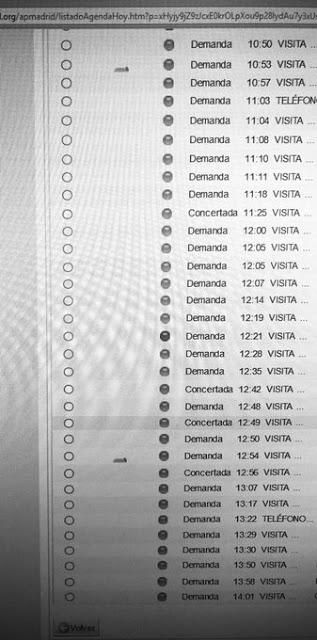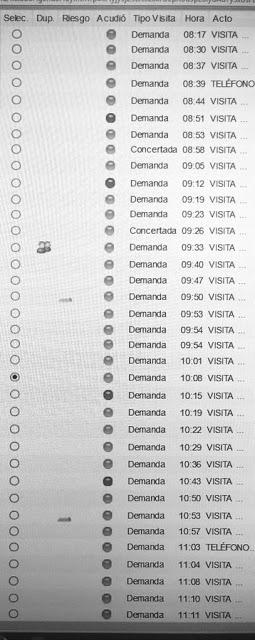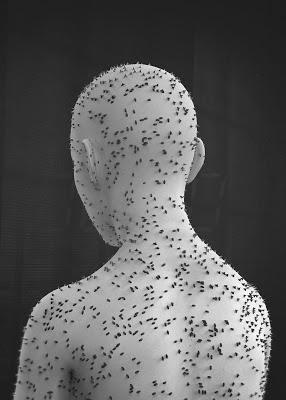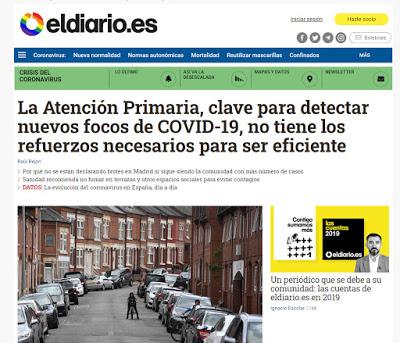

Fotos de @RedondoSonia
Llevo varios meses reflexionando sobre el maltrato a profesionales sanitarios, una realidad que por incómoda suele ser insuficientemente visibilizada. Lo cierto es que está plenamente admitido por la sociedad y las instituciones sanitarias y suele empezar el primer mes que el médico residente pisa la urgencia y se le obliga a concatenar tres o cuatro turnos de trabajo seguidos. Esto no pasa en ninguna otra profesión, va contra las leyes. Paradójicamente nadie termina con esa práctica que obliga a los facultativos a aguantar el tipo demasiadas horas seguidas, por muchas huelgas y protestas que se hagan.
Puedo decir que cuando uno llega a las 3 o 4 de la madrugada tras haber trabajado 20 horas seguidas, extenuado y todavía con pacientes que atender, entra en un estado físico y mental de sufrimiento en el que se desea terminar con todo. Algo muy parecido al horror. La mala noticia es que esto no acaba con la residencia. Más adelante cuando se pasa una consulta de medicina de familia algo similar ocurre esos días en los que hay que enfrentarse a agendas con más de 50 o 60 citados. A modo de ejemplo les diré que en lo que va de semana he atendido a 68, 54 y 51 pacientes en los últimos tres días, y considero que mi centro de salud es de los más favorecidos. El sistema sanitario se convierte muchos meses al año en una trituradora de picar carne de sus profesionales convertidos en recursos humanos en línea de montaje obligados a atender todo lo que entra por la puerta. Los que trabajamos en Atención Primaria o en cualquier urgencia lo sabemos bien.
La agenda normal de un médico de familia debería ser de unos 25-35 pacientes al día, lo que excede de ese número se "fuerza" es decir se añade a mayores. Raro es el día que no hay dada forzado, máxime cuando hay que estar permanentemente "asumiendo" los pacientes que deben ser atendidos por ausencia de otros compañeros. Lo normal es trabajar en situación forzada permanente: trabajo forzado.
Dos de mis mejores amigos no aguantaron. El primero tomó la decisión de marchar a otro país comunitario donde está encantado atendiendo a la mitad de pacientes ganando el doble. El segundo terminó encadenando bajas hasta que un tribunal médico le eximió del trabajo por enfermedad grave. Hay muchos más. De hecho lo normal es que pasadas dos o tres décadas de ejercicio profesional un gran porcentaje acabe quemado o convertido en zombi sanitario en modo supervivencia permanente.
Esto creo que es apropiado llamarlo maltrato. Y como tal comparte algunas características con otras formas similares de relación distópica. Una de ellas es la gran dificultad de reconocer el problema que tiene quien lo padece que suele ser la última persona en darse cuenta.
Al no reconocerlo nadie hace nada. Ni los afectados, que como mucho expresan su malestar en charlas de café o en otros foros sin que afecte mucho al devenir de las cosas. Ni la institución sanitaria y sus responsables que aducen impotencia para cambiar las cosas. Ni por los ciudadanos que mientras tengan libre acceso a pruebas y tratamientos asumen con paciencia las esperas o inconvenientes que puedan plantearse. De hecho algunos impresentables echan más madera al fuego increpando, amenazando o golpeando su frustración en el primer sanitario que encuentran, habitualmente su médica de cabecera.
En este estado de cosas cada año el maltrato aumenta la presión, si quieren un ejemplo sigan lo que ha pasado este año en el consultorio de el Álamo en Madrid paradigma de lo que ocurre en tantos otros sitios. Un servidor nunca había visto cosas como esta. Dos médicos de familia con contrato de pediatría llegaron a asumir siete cupos (dos de pediatría y cinco de medicina de familia) y no pasó nada. De hecho la directora del equipo les decía que no se quejen tanto que este verano están estupendamente... y varios administrativos y enfermeras de ese centro se enfrentaron a dos médicas por haberse atrevido a visibilizar una situación de sobrecarga que ya dura cinco meses (no ha habido servicio en turno de tarde en ese tiempo) ante una periodista.
Me apena ser testigo del derrumbe sanitario y sufrir la impotencia de querer dar un servicio de calidad a mis pacientes pero estar condenado muchos días a hacer una chapuza que no cumple los criterios de seguridad del paciente y calidad mínimamente exigibles.
Y comparto mi miedo de entrar en ese modo zombi que padecen tantos compañeros y compañeras quemados, algo que cada vez respeto más. Quien padece quemaduras de tercer grado en gran parte de su piel conoce el significado de la palabra sufrimiento, los profesionales sanitarios dañados también.
Sirvan estas líneas para decirles que no están solos, por mi parte me doy cuenta de esa gran corriente de dolor que va a terminar matando el servicio sanitario que conocíamos para entrar en otra cosa que todavía parece no tener nombre. No puedo añadir más.
 Abuse of health profesisonals
Abuse of health profesisonals
I have been reflecting for several months on the abuse of health professionals, a reality which, however uncomfortable, is often insufficiently visible. The truth is that it is fully accepted by society and health institutions and usually begins the first month that the resident doctor steps on the emergency and is forced to concatenate three or four shifts in a row. This does not happen in any other profession, it is against the law. Paradoxically, no one puts an end to this practice, which forces doctors to put up with it for too many hours in a row, no matter how many strikes and protests are held.
I can say that when one arrives at 3 or 4 in the morning after having worked 20 hours in a row, exhausted and still with patients to attend to, one enters a physical and mental state of suffering in which one wishes to end everything. Something very similar to horror. The bad news is that this does not end with the residency. Later on, when a family medicine consultation is spent, something similar happens on those days when you have to face agendas with more than 50 or 60 appointments. By way of example, so far this week I have seen 68, 54 and 51 patients in the last three days, and I consider my health centre to be one of the most favoured. Many months of the year the health system becomes a meat grinder of its professionals converted into human resources on the assembly line obliged to attend to everything that comes through the door. Those of us who work in Primary Care or in any emergency know this well.
The normal schedule of a family doctor should be about 25-35 patients a day, what exceeds that number is "forced" that is to say, added to greater ones. Rare is the day when there is no forced delivery, especially when you have to be permanently "assuming" the patients that must be attended due to the absence of other colleagues. It is normal to work in a permanent forced situation: forced labour.
Two of my best friends didn't make it. In one case he made the decision to go to another EU country where he is happy to take care of half of the patients and earn twice as much. In another he ended up chaining up casualties until a medical court ended up exempting him from work due to serious illness. There are many more. In fact, after two or three decades of work, a large percentage of us are usually burned or turned into health zombies in permanent survival mode.
I think it's appropriate to call this abuse. And as such it shares some characteristics with other similar forms of dystopic relationship. One of them is the great difficulty of recognizing the problem of the person who suffers it, who is usually the last person to notice it.
By not recognizing it, nobody does anything. Not even those affected, who at most express their discomfort in coffee talks or other forums without affecting the course of things. Nor the health institution and those in charge who claim powerlessness to change things. Nor by the citizens who, while they have free access to tests and treatments, patiently assume the waits or inconveniences that may arise. In fact, some of the unpresentable throw more wood on the fire by scolding, threatening or beating their frustration at the first health care provider they find, usually their family doctor.
In this state of things every year the abuse increases the pressure, if you want an example follow what has happened in the health center of the Alamo in Madrid paradigm of what happens in so many other places. Ir had never seen things like this. Two family doctors with a pediatric contract came to assume seven agendas (two in pediatrics and five in family medicine) and nothing happened. In fact, the director of the team told them not to complain so much that this summer they are doing great... and several administrators and nurses of that center confronted two doctors for having dared to make visible a situation of overload that has already lasted five months (in fact there has been no service in the afternoon shift in that time) to a journalist.
I am sad to witness the collapse of the health system and to suffer the impotence of wanting to provide a quality service to my patients but being condemned for many days to a botched job that does not meet the criteria of patient safety and quality that are minimally required.
And I share my fear of going into that zombie mode that so many of my colleagues suffer from, something that I respect more and more. Anyone who suffers third-degree burns to a large extent knows the meaning of the word pain, and so do the damaged health professionals.
These lines serve to tell you that you are not alone, for my part I realize that great current of pain that is going to end up killing the health service that we knew to enter something else that still seems to have no name. I cannot add any more.
 濫用健康專業人士
濫用健康專業人士
自動翻譯,對錯誤感到抱歉。
我幾個月來一直在反思濫用衛生專業人員的情況,儘管這種情況令人不舒服,但卻常常看不到。事實是,它已被社會和衛生機構完全接受,並且通常從住院醫生踏上緊急情況的第一個月開始,被迫連續三,四班接班。在其他任何行業都不會發生這種情況,這是違法的。矛盾的是,沒有人能終止這種做法,無論醫生舉行了多少次罷工和抗議活動,這種做法都迫使醫生連續數小時忍受這種做法。
我可以說,當一個人連續工作20個小時後,在凌晨3或4時到達,精疲力盡,仍然有病人在照料,人們進入一種身心痛苦的狀態,希望結束一切。非常類似於恐怖的東西。壞消息是,這並沒有以居住權結尾。後來,當進行家庭醫學諮詢時,在那些日子裡,當您不得不面對超過50或60個約會的議程時,也會發生類似的情況。舉例來說,本周到目前為止,我在過去三天裡看過68、54和51位患者,我認為我的健康中心是最受好評的之一。一年中的許多個月,衛生系統成為其專業人員的絞肉機,在流水線上轉換為人力資源,必須負責所有通過門的事情。我們在基層醫療或任何緊急情況中工作的人都知道這一點。
家庭醫生的正常時間表應該是每天約25-35名患者,超過該數字的是“強迫”的,也就是說,增加了更多的患者。罕見的一天是沒有強制分娩的日子,尤其是當您由於其他同事的缺席而不得不永久性地“假設”必須接受治療的患者時。在永久性強迫情況下工作是正常的:強迫勞動。
我的兩個最好的朋友沒有成功。在一個案例中,他決定去另一個歐盟國家,在那裡他很樂意照顧一半的患者,收入是後者的兩倍。在另一起案件中,他最終束縛了人員傷亡,直到醫療法庭最終因嚴重疾病免除了他的工作。還有更多。實際上,經過兩到三十年的工作,我們中的很大一部分人通常以永久生存的方式被燒死或變成健康殭屍。
我認為稱這種濫用為宜。因此,它與其他類似的異常位關係具有某些特徵。其中之一是很難識別遭受痛苦的人的問題,而後者通常是最後一個注意到該問題的人。
通過不認識它,沒人會做任何事情。甚至沒有受影響的人,他們在咖啡對話或其他論壇中最多表示不舒服,卻不影響事情的發展。衛生機構和聲稱無能為力的人也無濟於事。公民也可以自由地接受檢查和治療,但耐心地承擔可能引起的等待或不便。實際上,一些難以形容的人通過向他們找到的第一家醫療服務提供者(通常是家庭醫生)罵,威脅或擊敗他們的挫敗感,向他們扔了更多的柴火。
在這種情況下,虐待每年都會增加壓力,如果您想舉一個例子,那就看看馬德里阿拉莫健康中心發生的事情,這是在許多其他地方發生的事的範例。我從未見過這樣的事情。兩位有兒科合同的家庭醫生開始承擔七個議程(兒科兩個,家庭醫學五個),什麼也沒發生。事實上,該團隊的負責人告訴他們不要抱怨太多,以至於他們今年夏天過得不錯……而且該中心的幾名管理人員和護士面對兩位醫生,因為他們敢於發現已經持續的超載情況五個月(實際上是那個下午的輪班時間沒有給記者)。
我很傷心,見證了衛生系統的崩潰,遭受想要提供優質的服務,我的病人,但被譴責多日拙劣的工作並不滿足最低程度患者的安全和質量標準的陽痿需要。
我也擔心進入如此殭屍模式,我的許多同事都為此感到痛苦,我越來越尊重這種東西。任何遭受三度燒傷的人在很大程度上都知道“痛苦”一詞的含義,受損的醫療專業人員也是如此。
這些行告訴您您並不孤單,就我而言,我意識到痛苦的大潮最終將殺死我們知道進入其他似乎還沒有名字的醫療服務。我不能再添加了。
¿acaso solo Salvador Casado vive las cosas así? Es imprescindible que otros médicos y profesionales que compartan esta situación se pronuncien. Este es un problema que merece más énfasis, porque administración es sorda. Es inadmisible callarse porque parece que es un problema más https://t.co/UuNOMLPMTH — Juan Irigoyen (@juanirigoyen11) August 6, 2020
